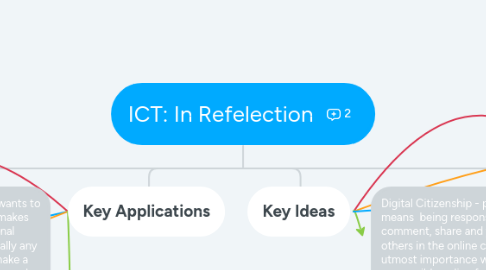ICT: In Refelection
by Brady Nurse

1. this and other sites like it are great resources for building sites both with and for your students! You could have them create an online art gallery, make a mock profile for a book character, create a factual page in science and so on!!
2. Animoto.com/Animated Presentations - This site and similar ones are great for creative visual presentations, moving timelines and many more possibilities!
3. Mindmeister.com/Mind Map and Brainstorming - a great and easy activator or tool for brainstorming ideas with the kids. You can get ideas out fast and organize them as you go so they have lots of time to generate more ideas!
4. Digital Citizenship - part of being online means being responsible in what you comment, share and your overall impact on others in the online community. It is of the utmost importance we teach kids to be responsible online for this and to be a critical audience. Kids can easily become bullies or victims online and teaching them how to be responsible digital citizens can reduce this.
5. Key Ideas
6. Key Applications
7. iMovie/Movie Editors - every kid wants to be famous and this type of stuff makes them feel that way in an educational setting! It can be applied for virtually any course material (what can't you make a movie about?), exercises creativity and builds confidence!
8. Potential for Creative Use - One key take away from the class for me was how ENDLESS the possibilities are to include new technology and how engaging and dynamic it can be for the kids. I have a few examples connected to "Key Applications" but the possibilities are endless!!
9. Copyright - this was something I learned a lot about as I apparently knew very little prior. Respecting both the kids copyright and the copyright of materials we use is very important. Modelling the appropriate way to give credit is essential in having the kids understand this too.
10. Digital Literacy - this is sort of the other side of the coin from "Digital Citizenship" in which you are in the active role, here you are in a passive one. This is the audience side and being an intelligent audience is vital to the safety of students. There is a lot of false information online and children don't inherently know how to spot it; we need to teach them.


